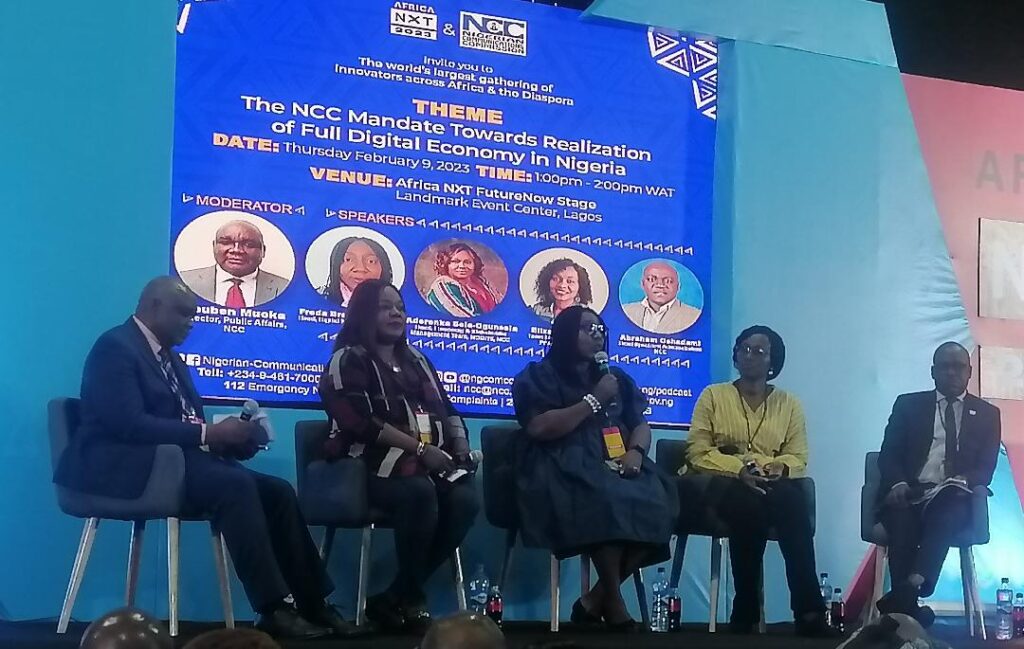The Nigerian Communications Commission (NCC) has said it is working assiduously towards realising the eight-point agenda of the government and the digitalisation of the Nigerain economy.
Among the eight-point agenda are creating broadband infrastructure and facilities across Nigeria, creating ICT innovation and investment opportunities, facilitating strategic collaboration and partnerships, enabling more players to enter the operating field to ensure robust competition and creating digital innovation and entrepreneurship, according to Reuben Mouka, director of public affairs who spoke at AfricaNXT event recently.
Towards this end, the Commission said it was currently focusing on several core areas of the agenda, among which is the development of skills Nigerian youths, including women, young girls and boys at all levels and across the 36 states of Nigeria and Abuja, Federal Capital Territory.
NCC’s Head of Digital Skills and Services, Mrs Freda Bruce-Bennett, also spoke at the event with the theme: ‘The NCC Mandate Towards Realization of Full Digital Economy in Nigeria’.
She said developing digital skills for Nigerians has become necessary following the Nigerian Office for Developing Indigenous Telecoms Sector (NODITS), whose mandate is to encourage indigenous participation in the telecom sector.
According to her, the creation of the NODITS has started yielding desired results as indigenous have now been engaged in producing products and services that were hitherto imported. She noted that this move is boosting the government’s digital economy pursuit.
One such product is the production of SIM cards, which she disclosed has helped the Nigerian government to save about $12 million owing to the ban on whole Subscriber Identity Module (SIM) importation. “As we speak, six indigenous companies were licensed by the NCC to manufacture SIM cards. Four of these six are operational and have manufactured over 100 million SIM cards, saving Nigeria about $12 million from the importation of SIM cards,” she said.
Also speaking on what the NCC is doing to drive the digital economy, the Head of Spectrum Administration at the NCC, Mr Abraham Oshadami, said the Commission has slashed licensing fees for Internet Service Providers to as low as N500,000.
This is an effort to roll out telecoms infrastructure across the country to achieve the Government’s National Broadband Plan.
Head of Financing and Stakeholder Management Team, NODITS at the NCC, Mrs Aderonke Sola-Ogunsola, expressed optimism that the country can continue to make progress in the banning of more telecoms device such as Smartphones, phone chargers and SIM cards, adding that before the ban, SIM was imported into Nigeria.
According to her, Nigeria can manufacture SIM in Nigeria, stressing that with the ban and the manufacture of SIM in the country, there will be more jobs and the saving of FOREX for the nation.
Meanwhile, the Director of Public Affairs at NCC, Mr Reuben Muoka, in his opening remark, stated that digital literacy skills are one of the key focuses of the Commission, stressing that without digital skills, citizens will not be able to reach maximum derivation of the digital services and innovations- resulting from the efforts of the digital economy.
Muoka, who moderated the panel session on the eight pillars of the digital economy, stated that the NCC has been at the forefront of encouraging skills and innovation through the NODITS and giving all the perspectives from which the panellists spoke.












